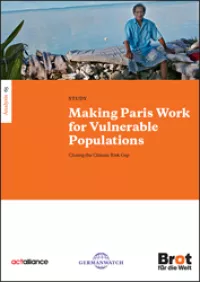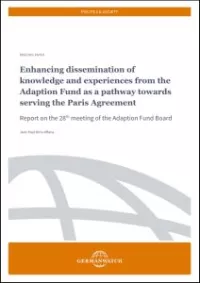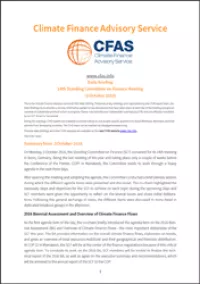Aktuelles zum Thema
Blogpost
Blog post by Dr. Joachim Fünfgelt (Bread for the World), Jens Klawitter and Lutz Weischer (both Germanwatch), May 2017
The African continent and its population suffer from severe energy poverty. The International Energy Agency estimates that the total grid-based power generation capacity in 2012 was only about 158 gigawatt (GW), which is less than total installed capacity in Germany alone. Consequently, the majority of the African population – approximately 622 million out of 922 million people living on the continent – still lacks access to modern energy services. Although the African continent has abundant renewable energy (RE) resources, the potential for the generation of renewable electricity has not been realized yet. Hence, besides the traditional use of solid biomass, the African electricity mix is still dominated by fossil fuels, such as oil, coal, and gas, as well as large hydro power plants. ...
Blogpost
Blog post by Gerrit Hansen, April 2017
The climate vulnerable forum (CVF), now uniting 49 of the world’s countries most vulnerable to climate change, has again taken centre-stage in the fight against global warming and for an equitable international climate regime. At the recent IMF and World Bank spring meeting in Washington, the finance ministers of the group, the Vulnerable 20 (V20), met with representatives of its “big brother”, the G20, to discuss issues related to climate finance, effective mitigation policies, support for adaptation and resilience and above all: enhanced cooperation.
Blogpost
Blog post by Neoka Naidoo, April 2017
South Africa is the only African country in the G20. It is challenged by a slowing, energy intensive economy, an enormous stock of ageing infrastructure in coal and very high inequality. For dealing with these challenges, South Africa needs to change its development strategy. Political momentum within the G20 could help to break the fossil fuel inertia.
Publication
Criteria and indicators for conducting a sustainability assessment of different electricity generation technologies in Morocco, Jordan and Tunisia
In the latest publication of the project Middle East North Africa Sustainable ELECtricity Trajectories (MENA-SELECT), the authors Boris Schinke and Jens Klawitter (Germanwatch) together with Maurice Döring (BICC), Nadejda Komendantova (IIASA), Jenan Irshaid (IIASA) and Joanne Bayer (IIASA) develop criteria and indicators for conducting a sustainability assessment of different electricity generation technologies.
Press Release
Today, the Regional Court Essen dismissed the civil suit of Peruvian mountain guide Saúl Luciano Lliuya against RWE. The legal process is likely to continue: Attorney Verheyen announced that her client will “most likely” present an appeal at the Higher Regional Court Hamm.
Press Release
After the initial hearing at the regional court in Essen, the civil chamber will announce on December 15 whether the first European civil court climate case against a big emitter will proceed to the evidentiary phase. The Peruvian mountain guide Saúl Luciano Lliuya wants to achieve that the energy giant RWE covers a share of the preventative measures against climate effects needed in his hometown.
In the “climate suit” of Peruvian mountain guide and small farmer Saúl Luciano Lliuya against RWE, the regional court in Essen has announced that it will decide on December 15 whether the suit will proceed to the evidentiary phase. Thus it remains unclear whether, for the first time, a German civil court will probe in detail the question to what extent big contributors to climate change must pay for the costs of preventative measures against the risks that others face in the course of global climate change. The claimant Saúl Luciano Lliuya and his attorney Dr. Roda Verheyen (Hamburg) are optimistic. “In an open proceeding, we laid out why our claims are valid and legitimate, and why this is a matter that the regional court must consider”, says attorney Roda Verheyen.
Blogpost
Blog post by Boris Schinke, November 2016
Boris Schinke, Senior Advisor Energy and Development, interviewed Safa Al Jayoussi, head of the Climate and Energy campaign of the NGO "Indyact" based in Lebaon and Jordan. She is also the co-coordinator of the Climate Action Network Arab World.
Publication
Closing the Climate Risk Gap
In December 2015 the Paris Agreement was adopted, in November 2016 it will come into force. A transformation of the energy-, transport- and agricultural sector is needed, to be able to implement the goals agreed upon and to limit global warming to 1.5°C/well below 2°C.
Publication
Report on the 28th meeting of the Adaptation Fund Board
The Adaptation Fund Board successfully concluded its 28th Meeting in Bonn, Germany from 4–7 October 2016 only a month before the twenty-second session of the Conference of the Parties to the United Nations Framework Convention on Climate Change (COP22) which will be held in Marrakech, Morocco. The meeting encouraged reflections on how to fully enhance dissemination of knowledge and experiences generated by the Fund in order to leverage the understanding about its relevance and contributions to adaptation efforts of nations and communities worldwide facing the adverse effects of climate change.
Publication
3rd to 5th October 2016, Bonn (Germany)
This is the Climate Finance Advisory Service (CFAS) Daily Briefing. Produced at key meetings and negotiations by the CFAS expert team, the Daily Briefings try to provide a concise, informative update on key discussions that have taken place at each day of the meeting and give an overview of substantive points of action or progress.







